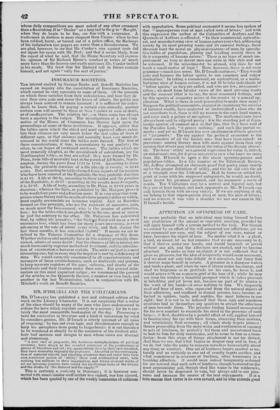INSURANCE SOCIETIES.
THE interest excited by Savings Banks and Benefit Societies has caused an inquiry into the constitution of Insurance Societies, which cannot be very agreeable to some of them. Of the grounds on which these societies form their calculations, and how they de rive their own gain and cover the losses of others, the public has always been content to remain ignorant : it is sufficient for indivi- duals to know that, by paying a certain sum annually, another certain sum will accrue to them or their families in case of death, or of conflagration. The relation betsseen these sums has always been a mystery to the vulgar. The inVestigations of a late Corn mittee of the House of Commons has thrown light upon the proceedings of some of these institutions. It appears, either that the tables upon which the oldest and most approved offices calcu- late their chances are very much below the real value of lives at different ages, or that sickness and mortality have very much de- creased in the world since the tables were formed. The first of these considerations, if true, is consolatory to our pockets ; the other, to our hopes of continued existence. The tables which are most generally adopted, as the groundwork of calculation, are the Northampton tables, as they are called : they were formed by Dr. Price, from bills of mortality kept in the parish of All Saints, North- ampton, during the years from 1733 to 1780. According to these tables, the probable duration of a life already at twenty, is 33.43 years. But, according to tables formed from reports of the number who have been assured at the Equitable, the true probable duration is 41 05. A life at tint ty, according to these tables and the practice
i
of the Equitable, s 28'2 7 : according to the results from its reports, it is 33-97. A life of forty, according to Dr. Price, is 23.08 years in duration ; whereas the facts, as published by Mr. Morgan, prove it to be worth four years and a fraction more. It is very clear that corn parries whose theory and the resalts of whose practice differ so widely, must rapidly accumulate an immense capital. Just as Societies formed on this principle, who are the receivers of annuities, gain, so much must the Government, who is the granter of annuities, lose : for the tables which are profitable to the one, must of course be just the contrary to the other. Mr. Finlayson has calculated that, by selling life annuities, "the Sinkiisgs Fund will incur a most enormous loss, which has been for many years increasing, is even advancing at the rate of 8000/. every week, and that, during the last three months, it has exceeded e3,0001." It seems we are in- debted to the Finance Committee for a stoppage of this drain. Whether sickness and mortality have in this country generally dimi- nished, admits of some doubt : that the chances of life in infancy are much increased by superior methods of treatment, and the introduc- tion of vaccination is however certain. The entire subject is a most interesting one, but in every step the inquirer is met by a deficiency of data. We would earnestly recommend to all superintendents and managers of large establishments, such as dockyards and prisons, to keep accurate registers of the ages, sickness, and deaths of the individuals and their families under their care. For general infor- mation on this most important subjec', we recommend the perusal of the articles in the Quarterly Review, a number or two back, and another in the last lVestminster, taken, in conjunction with Dr. Mitchell's work on Benefit Societies.


















 Previous page
Previous page